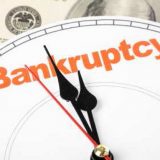Bankruptcy is a huge decision to make and a turning point in anyone’s life. It will have a big impact in how you live your life and view finances. It can seriously damage your chances of acquiring assets and building wealth in future. But it doesn’t make it impossible. In fact, for some people, declaring bankruptcy can be the only option available. But it takes a lot of consideration to make that decision and a lot of preparation on what you’ll do after.
Your options
First, you have to consider whether you really need to declare bankruptcy or not. Most of the time, the decision is made because debts have gotten out of hand and beyond your means of payment. Though occasionally, this kind of financial strife can happen because of a sudden disaster to your property or assets. All the same, consider what else you can do. Do any of the other options of dealing with debt apply? Perhaps prioritising and paying off your most urgent debts first could give you some breathing room to deal with the rest. Payback schemes or debt consolidation might make it easier to manage instead of lots of separate debts. There are options for all kinds of situations before you declare.
Declaring bankruptcy
If none of those options are going to be of any help to you, then it may just be time to declare bankruptcy. First, you need to know the exact laws and types of bankruptcy available to you. These differ hugely from country to country, even state to state. Know whether your debt is secured by assets or not. If it’s secured, you may be liable to losing your home or your car to make up for the payments. Most people going for bankruptcy go for the liquidation kind. This means using those assets to pay as much as you can, before debts are stricken off. You should be careful with this, however, because any co-signers on your debt will still be liable.
Living frugally
There’s understandably a lot of nervousness about what happens after bankruptcy. But filing for bankruptcy does not mean you’ll be living the rest of your life in poverty. Even if it’s a bankruptcy that ends with a repayment plan in place, many are able to secure a house or car in their future. The key to getting back to the life you want is to get used to living frugally for a while. You’re going to have less assets to rely on and perhaps new payments to make. But it’s far from impossible. Rent a small space and motivate yourself to getting back to financial strength. Don’t give up on the idea of personal wealth just because things have gone bad for you so far.
Repairing your credit
It’s going to take time to get back to good financial health and repairing your credit is a huge part of it. Getting good credit is about being able to prove you are reliable with debts. Naturally, straight after a bankruptcy, that would be impossible to prove. There are lots of ways to slowly get you back on track, however. You could use a credit repair firm such as Lexington Law to take a close look at your credit history, for example. There are parts you may be able to prove inaccurate and have stricken from it. You might find that some of big black marks on your own report start to disappear. It will take some time and proof of reliable credit usage as well, but with the right mindset, you can get your credit score back up to snuff.
Live and learn
The biggest lesson to learn from bankruptcy is how to avoid getting in that situation ever again. You need to take charge and get proactive with your finances. The best way to do that is to start learning the ins-and-outs of them. Mark down every expense you go through on a monthly/quarterly basis. Take into account your income. From there, make a budget. With the right budget and expense tracking, you can even start to use loans again. Just stick to it, watch your money and know when to cut your spending off. Live and learn from bankruptcy so you never have to go through it twice.
Life after bankruptcy isn’t impossible. But it is a good deal more difficult. With the perseverance and dedication to getting yourself back on track, you can do just that. Just take care to be a lot more responsible with your finances that even before.







